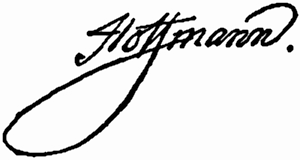From Bamberg to Berlin (Von Bamberg nach Berlin)
1813: Director of music at the “Theatre Joseph Secondas” in Dresden and Leipzig; Hoffmann experiences both the Battle of Dresden (August 26th – 27th 1813) – a major engagement of the Napoleonic Wars – and the siege of Dresden by Napoleon’s troops.
1814: break-up of Hoffmann and Seconda; re-entry into the civil service at the chamber court in Berlin
1815: New apartment in Taubenstreet 31 (near Gendarmenmarkt, Berlin); stories for paperbacks and almamacs; „Fantasiestücke in Callot´s Manier“ (1814/1815) (Fantastic pieces in Callot’s manner) published at Kunz in Bamberg.
1816: Appointment as a full member of the criminal senate at the court of appeal in salary; „Elixir des Teufels“ (The Devil’s Elixirs, a novel, 1815/1816); world premiere of his opera „Undine“ at Natinal Theater on the King`s birthday on August 3rd.
1817: The National Theater was destroyed by a fire after only 13 performances of „Undine“; „Nachtstücke“ (The Sand-man and Other Night Pieces, 1816/1817); frequent visits of the wine merchants Lutter & Wegner
1818: serious illness; formation of the literary and social circle The Serapion Brethren (Die Serapionsbrüder), formed in Berlin. The Serapion Brethren is also the title of a four-volume collection of Hoffmann’s novellas and fairytales that appeared in 1819, 1820, and 1821.
1819: Hoffmann was appointed to become a member of an „immediate investigation commission“ in order to detect highly traitorous connections; expert opinion of Hoffmann on the release of imprisoned demagogues; conflict with the government
1820: Princess Brambilla („Prinzessin Brambilla“)
1821: Promotion to the upper-appellate-senate; The Serapion Brethren („Serapionsbrüder“) (1819-1821); The Life and Opinions of the Tomcat Murr („Lebensansichten des Kater Murr“ 1819-1821); manuscript of “Master Flea” („Meister Floh“) to publisher Wilmans.
1822: beginning of fatal disease; confiscation of the manuscript of “Master Flea” by Prussian authorities; police chief Karl Albert von Kamptz has Hoffmann prosecuted for revealing official secrets and for his criticism of demagogues’ prosecution; Being unable to write himself any more, Hoffmann dictates the ending of „Master Flea“ as well as the tale “My cousin’s corner window” (Des Vetters Eckfenster) and The Foe (“Der Feind”).
June 25th, 1822: Hoffmann dies at age 46.
